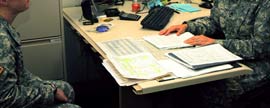AMENDED POST:
First Thanks to SGT Nick and SSG G! Based on the information they provided I have amended my answer. Bottom line I believe a Soldier that has had a miscarriage “Cannot” be placed in the Army Body Composition Program because they were in fact “Pregnant”. However the Soldier must provide official documentation to the chain of command that she was “Pregnant”.
SSG G specifically shared the following extract of AR 600-9:
AR 600-9 also states:
3–15. Pregnancy
a. Personnel who meet this regulation’s standards and become pregnant will be exempt from the standards for the duration of the pregnancy plus the period of 180 days after the pregnancy ends.
“So, the day after a miscarriage would fall within that 180 day window”.
Here are the basic requirements for weighing a Soldier.
AR 600-9 states:
3–4. Weigh-in and body fat assessment
a. Weigh-ins and body fat assessments will be conducted in accordance with appendix B. All Soldiers will be weighed every 6 months, at a minimum.
FM 7-22 states:
RECOVERY FROM INJURY, ILLNESS, OR MEDICAL CONDITION
6-6. Soldiers recovering from injury, illness, or other medical conditions must train within the limits of their medical profiles (DA Form 3349 [Physical Profile]) and be afforded a minimum train-up period of twice the length of the profile. Prescribed train-up periods must not exceed 90 days before APFT administration or other unit physical readiness goal requirements according to AR 350-1.
The significant issue in this situation is that the Soldier did not have documentation that she was pregnant. Therefore the chain of command had a couple of options:
1. The most logical one would be to provide the Soldier the ability go to the medical facility and obtain official documentation.
a. If the Soldier returned with documentation the issue is resolved. The Soldier would not be enrolled.
b. If the Soldier was unable to obtain official documentation the chain of command in my opinion would be within their rights to TAPE the Soldier.
2. Tape the Soldier and if the Soldier is found to exceed the standard; suspend enrollment into the ABCP until the Soldier has had an opportunity to try and obtain official documentation of the miscarriage from a military doctor or civilian doctor working at a military medical facility that is authorized to complete a physical profile.
“To verify this information I would encourage you to contact your local IG office.”
Did you find this information useful? We appreciate your feedback!
TOP














Comments
SSG G
AR 600-9 also states:
3–15. Pregnancy
a. Personnel who meet this regulation’s standards and become pregnant will be exempt from the standards for the duration of the pregnancy plus the period of 180 days after the pregnancy ends.
So, the day after a miscarriage would fall within that 180 day window.
Mark Gerecht
SSG G,
First Thanks for the information and correction. I sincerely appreciate your assistance/sharing of information and will amended my post. By the letter of the regulation “if” the Soldier was Pregnant and she produced official documentation from a military medical facility she “would not be eligible” to participate in the Army Body Composition Program.
My thought process with regard to the post was:
1. She did not provide a documentation from a military medical facility. Therefore she could be taped until such time as she could prove she was pregnant with official paperwork.
2. If she was pregnant any time between 1 day and 12 weeks usually she would not have gained any weight or have been adversely impacted from a weight perspective. Unless of course the Soldier was borderline from a weight perspective to begin with. However your extract of AR 600-9 makes this a mute point.
Again I greatly appreciate your input! Old dogs can learn new tricks. I hope you will continue to post on ASKTOP.net in the future.
Respectfully,
TOP
SGT NICK
IAW AR 40-501, 7-9d(7): Upon the diagnosis of pregnancy, the Soldier is exempt from regular
unit physical fitness training and APFT testing/weight standards for the duration of the
pregnancy and 180 days past pregnancy termination. After receiving medical clearance from
their health care provider to participate in physical training, commanders will enroll Soldiers
who are pregnant or postpartum to take part in the Army Pregnancy/Postpartum Physical
Training (PPPT) Program.”
Pregnant Soldiers are using the “termination” terminology to claim that it should apply to Soldiers that get abortions or those that have miscarriages as well. The regulation never states that the Soldiers have to carry the fetus to term to get the profile and exemption from ABCP.
This is just something that needs to be clarified in future doctrine.